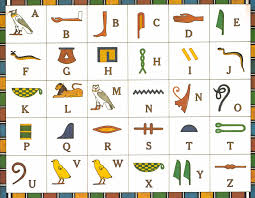Deconstructing an Essay While Writing It
The first sentence of an essay often comes at the beginning and is probably its most important. The next sentence comes second, which is the same way a thoughtful husband makes love to his wife. The 3rd sentence is usually truant and can be found gorging itself at an all-you-can-eat buffet. So by the fourth sentence you need a catnap. Now the fifth sentence is where I try to arouse your interests in my story by slowly revealing its contours, but this amounts to no more than a pastie on the nipple of life. So by the sixth sentence the whole affair has grown a little tedious and that’s why the first sentence is so damn important.
The team leaders of my various support groups agree; the second paragraph must never be self-conscious. It should not draw attention to itself by including commonplace words and ideas you might see elsewhere. That’s a hard thing to do. To achieve this I might have to write in Egyptian hieroglyphs and then the reader (which I presume is you) would require a pith helmet, a large magnifying glass and perhaps the Rosetta Stone to decipher it. That’s too much work. I want you to enjoy this deconstructed essay, not go on an archaeological dig. You dig? Well Tut – tut. To quote myself one evening after taking way too much NyQuil: “Remember, penile is more than just a river in Egypt.”
Lest you think I’m not tracking this deconstruction and have descended into a literary world of clever ruses and cutesy digressions, I’ll have you know that by the 3rd paragraph the reader must be fully engaged. But how do I gracefully earn your attentions? Well, I propose we get married in between the covers – the book covers of course? If you say yes, then we’re literarily hitched and you’re fully engaged. If you say no, well then you can just forget about registering at Nordstrom’s. But for those who’ve accepted my proposal, it’s very big of you. In fact it’s bigamy too, especially if I marry more than one of you. But now that you and I are literally on the same page, I give you my vow: I pledge allegiance to this deconstructed essay and to the veracity for which it stands, one truth, under stood, with liberty and justice for all. (We may now remove our hands from our hearts and sit at our desks.)
By the fourth paragraph it’s apparent to everyone the honeymoon is over and no amount of Astroglide will change that. We each need to move on and do what’s best for each of us. You, because you’ve got a 4 year old barrel of slightly used black strap molasses to return to Costco (they take back anything) and me, because I’ve got some serious posing to do in front of a mirror. And even though I’m in a state of disbelief over our separation, I must remember, “Denial is more than just a river in Egypt.” I know we’ll reunite by the end of the story. After all, I’m the one who is writing it and that’s my wish. Anyway the 4th paragraph is really just a gateway paragraph to:
You guessed it – the 5th paragraph. According to Sara Palin’s new book “More Better Writing, Using Ghostwriters Not,” it is within the fifth paragraph where a theme is developed or a central idea is promulgated. And it is the vitality of that idea which lends credence to the entire endeavor. Incidentally, similar to home mortgages, lending credence grows more expensive as the interest rate of the reader increases. And as the appeal of my essays has skyrocketed, many distraught authors have found little or no market for their essays. This problem has not gone unrecognized. So in order to ensure Americans read other essays besides mine, the nation’s Federal Reserve Bank has decided to flood the marketplace with simple ideas in order to cheapen mine (That last humorously peculiar sentence is in keeping with paragraph 2’s notion of excluding commonplace words and ideas. Deconstruction is fun!). So, as promised, I herewith present the 5th paragraph’s theme – and it’s a biggie: I hope to do for spirituality what Einstein tried to do for physics. Oh you want me to explain it. Well that’s why God built the sixth paragraph. Alright it wasn’t God. It was me. God, me…details, details.
Among Albert Einstein’s numerous pursuits (see earlier Hardiman essay E=mc2), his ultimate quest was to marry the micro (Quantum Mechanics: atoms and such) with the macro (General Relativity: gravity and such) into a unified field theory commonly called ToE – the Theory of Everything. It may seem an impossible task, but it isn’t. In fact it’s already done. That is, it is all unified. There just isn’t a scientific proof of its’ singularity. It all comes from one and returns to one, and pity the poor human consciousness that doesn’t get that and is still standing in the exchange line at Costco trying to return a barrel of slightly used black strap molasses. And….and, having been returned the $237 they spent on it in 2009, they somehow feel made whole or at least ahead of the game for cashing out of something they’d never accept back if they ran Costco. (Pause to catch our breaths.) These sixth paragraphs can be quite dense and damning – like the corporate lobbyist who tenaciously promotes some self-serving loophole legislation that foils the greater good, and then deludes himself into thinking he truly believe in the merits of corporate welfare legislation when in reality all he likes is the corporate Kool-Aid, I mean his salary. As this paragraph concludes it is interesting to note that I may be the first human to put that together – people acting hypocritically for money. Dry stuff. That’s why we quickly and seamlessly segue to:
The 7th paragraph. The 7th paragraph is where I hope to say something authentic and original about our straitened earthly condition as well as our limitless soulful consciousness. Just as Einstein’s endeavored to unify the extreme, I too shall attempt to unify the micro (our individuated souls doggy-paddling down here on earth) with the macro (the indescribably joyful place of their origin). I believe vulgarity (bad things) and sublimity (good things) originate from the same source, and are in essence the same thing. I’m not saying I’m in favor of it, I’m just stating it as my truth. I’ll say it now. In the largest sense puppies and cancer are all manifestations of the same thing and are sourced similarly, although the line for teacup Chihuahuas is much longer than the line for leukemia. Love is the 7th wave and so is paragraph 7. You’ve done well to stay with this essay and now you will be treated to the dessert of paragraph 8.
Here in paragraph 8 I toy with a dessert idea by refracting it through a prism of feldspar then plating it with two scoops of vanilla ice cream and perhaps a sprig of mint I nip from my imaginary garden. My imaginary garden is where I grow most of my ideas and if I need a storyline I can always pull one from this imaginary plot. In any event this paragraph is designed to reward and please you my dear reader. It is here in this paragraph where I make my stand and scrupulously avoid the gratuitous use of the word disambiguation; no matter how smart it makes me feel or how casually I’m able to slip it into conversation. For example you won’t ever catch me saying this while ordering food:
Me: Garçon. I mean waiter. Yes, I’ll have the poached eggs with crispy bacon. Oh and let me clarify that. The “bacon” to which I refer is of the porcine variety and not Sir Francis Bacon inventor of the Scientific Method. I do hope my d-i-s-a-m-b-i-g-u-a-t-i-o-n makes clear my breakfast intentions.
Waiter: Well yes. Yes it does Mr. Man. Poached eggs with a side of crispy bacon and not the crispy exhumed remains of English statesman Sir Francis Bacon. Thank you for differentiating or disambiguating the two for me. Very kind indeed for there may have been confusion in the kitchen. And now just let me say on behalf of the kitchen staff and myself, that we will take every precaution to insure your food is not spit on multiple times.
Dessert is over. It’s time for fingerbowls as we enter the 9th and final paragraph. I’m glad we reunited in the 7th paragraph and can now finish our little story with your yearning eyeballs ogling the contours of my every word. And as I don’t know how much longer I have to live (who does), it is incumbent upon me to highlight the obvious. Namely, that someplace not very far removed from our awareness, unalloyed truth marches on paying no heed to our belief systems, whether they’re numinously nuanced or myopically knee jerk. Truth don’t care. This isn’t truth’s first rodeo. It is the rodeo.
(ps: Keep scrolling down…past the picture)
 What’s this? A 10th paragraph after I said the 9th was the final paragraph. Oh no. Authority breaking down. Seismic repercussions in the literary world as expectations are not met. Is this the end of earth? No. It’s just a literary technique not unlike the Beatles’ Sgt. Pepper album where after the reprise of Sgt. Pepper’s Lonely Hearts Club Band, a song we believe to be the bookend of that seminal album, comes the hauntingly eerie “A Day in the Life,” whose plaintive words and other worldly construction places it outside the realm of ordinary music and deserving of its location separate from the body of the album. Well that example parallels my use of paragraph 10. It is so wholly distinct, so beguiling, so enchantingly captivating, I’m compelled to append it outside the body of the essay. You won’t have to lend this paragraph any credence. It’s fully funded. Its worth will be known to you tonight when its axiomatic ideas and mystic persistence haunt you before bed. You see, in assuming God is omnipotent we realize he’s aware of each of his sparrows that fall from the sky and every barfly that’s ever chipped a tooth opening a beer bottle. He knows it all. And rather than us looking for healing or forgiveness or love; it is incumbent on us to promote healing, forgiveness and love. As the song goes: ♫I’d love to turn you on.♫ So have your way with the universe. Return your black strap molasses. Pose in the mirror. Deconstruct your essays. Model yourself after Einstein. Be part of the problem, but know you’re also the solution. This is “Settled Law.” On earth it just goes round and round and round. And that’s why: The first sentence of an essay often comes at the beginning and is probably its most important.
What’s this? A 10th paragraph after I said the 9th was the final paragraph. Oh no. Authority breaking down. Seismic repercussions in the literary world as expectations are not met. Is this the end of earth? No. It’s just a literary technique not unlike the Beatles’ Sgt. Pepper album where after the reprise of Sgt. Pepper’s Lonely Hearts Club Band, a song we believe to be the bookend of that seminal album, comes the hauntingly eerie “A Day in the Life,” whose plaintive words and other worldly construction places it outside the realm of ordinary music and deserving of its location separate from the body of the album. Well that example parallels my use of paragraph 10. It is so wholly distinct, so beguiling, so enchantingly captivating, I’m compelled to append it outside the body of the essay. You won’t have to lend this paragraph any credence. It’s fully funded. Its worth will be known to you tonight when its axiomatic ideas and mystic persistence haunt you before bed. You see, in assuming God is omnipotent we realize he’s aware of each of his sparrows that fall from the sky and every barfly that’s ever chipped a tooth opening a beer bottle. He knows it all. And rather than us looking for healing or forgiveness or love; it is incumbent on us to promote healing, forgiveness and love. As the song goes: ♫I’d love to turn you on.♫ So have your way with the universe. Return your black strap molasses. Pose in the mirror. Deconstruct your essays. Model yourself after Einstein. Be part of the problem, but know you’re also the solution. This is “Settled Law.” On earth it just goes round and round and round. And that’s why: The first sentence of an essay often comes at the beginning and is probably its most important.





